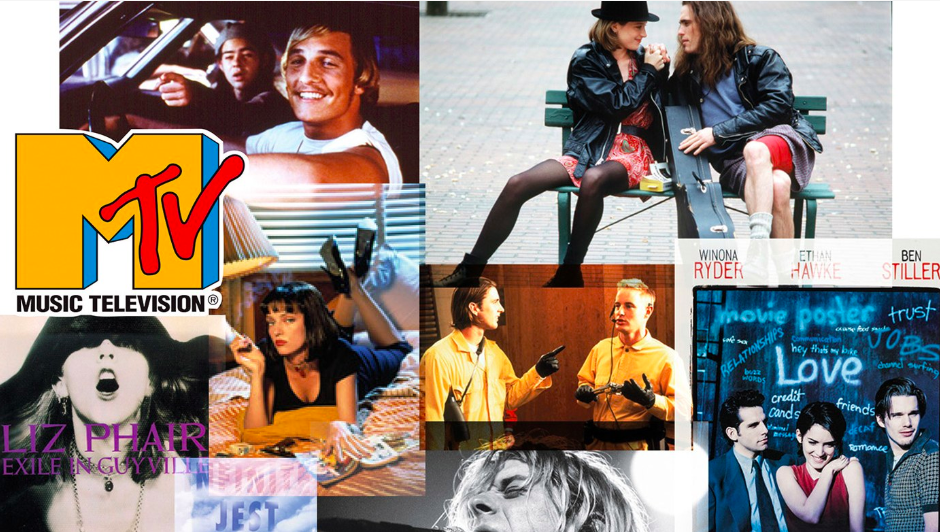In light of the (now possibly passé) “OK Boomer” meme bouncing around the internet in recent weeks, I’ve seen a number of social-media references to a 2017 Vanity Fair article entitled “Why Generation X Might Be Our Last, Best Hope,” which contained this startlingly relevant (for me, at least) piece of cover art containing pop-culture ephemera from 1992-1996.
This art startled me at first because it depicted the very “alternative” musicians and filmmakers – Liz Phair, Kurt Cobain, Quentin Tarantino, Richard Linklater, etc. – that I knew and loved at the time. It also startled me because those “alternative” musicians and filmmakers are exactly who I, a college-educated middle-class white guy, was expected to know and love at the time. It made me realize – or, at least, it reminded me – that “generational” tastes tend to be shaped and spoon-fed to the general populous by graduates of elite colleges who live in (and write commentary from) big cities like New York.
To be sure: I still think Pulp Fiction and Exile in Guyville and Dazed and Confused are brilliant; I just think these generational markers – and generalized talk about how “generations” think – have been greatly exaggerated. Nirvana’s 1991 album Nevermind (an album I did and do love) is seen as a generational touchstone, yet it was literally outsold by Garth Brooks’ Ropin’ the Wind in 1991 and Billy Ray Cyrus’s Some Gave All in 1992. Perhaps not all of those country-album sales could be chalked up to young people, but I suspect that Garth and Billy Ray never came to symbolize Generation X simply because they were popular with the wrong kind of young people – i.e. young people who weren’t college-educated and living in big cities like New York.
This anomaly was actually a real-time footnote to the significance of 1991, since the influence of the computerized (and more empirically accurate) SoundScan system on the Billboard charts that year revealed that hip-hop acts like NWA (as well as hipster-despised hair-metal acts like Skid Row) were also numerically popular with (the wrong kind of) young people. I listened to hip-hop at the time, yet was never encouraged to consider, say, the Geto Boys, as generational touchstones; that I didn’t listen to much country music probably had a lot to do with the fact that it was a legitimate form of pop-music where I came from in Kansas, and I was, at the time, an aspirational hip-guy living in grunge-adjacent Oregon.
In short, I suspect that the way generations are defined by media commentators is – much like those old generational music tastes – more the result of those media commentators’ urban/college-educated personal predilections than actual demographic tastes and beliefs.
Granted, I enjoy aligning myself with “Generation X” and I get a kick out of reading articles like “Why Generation X Might Be Our Last, Best Hope”; I just think the whole American generational concept is a way of flattering college-educated middle-class (usually white) folks who came of age at certain moments in history.
I like, for instance, how the Vanity Fair article reminds me of the “would-be futures we watched age into obsolescence—CD, DVD, answering machine, Walkman, mixtape, MTV, video store, mall.” I like how it asserts that we were “the last Americans that know how to fold a newspaper, take a joke, and listen to a dirty story without losing their minds.” It feels true when it notes that “a generation is the creation of shared experiences, the things that happened, the things you all did and listened to and read and went through and, as important, the things that did not happen.”
Past that, I’m not sure I’m all that comfortable making moral judgments on entire cohorts of American humans based upon when they were born. Have I at times found Baby Boomers to be overbearing? Good Lord, yes – to me, they have always seemed like the generational equivalent of children who’ve been raised without siblings – utterly unable to grasp that everything doesn’t revolve around them, that other people might have a legitimate point of view. Have I at times found Millennials to be annoying? There I’m less sure – too often we judge “generations” based upon what are in truth signifiers of youth, and millennials are still pretty young. (Still, a part of me is baffled by the seeming millennial disconnect between social-media performance and real-world conviction, to the point that I’m not sure they’re aware there’s a difference.) Yet even my occasional annoyance at the (demographically gigantic) generations before and after mine is probably informed by the college-educated middle-class nature of my relationship with both the media cycle and the communities I come into contact with.
All of which is to say that I am a Generation X person who doesn’t fully buy into the concept of generational generalizations.
(Which, it occurs to me, is a deeply Generation X thing of me to say.)
Note: I don’t host a “comments” section, but I’m happy to hear your thoughts via my Contact page. To learn more about what this blog is all about, read items #2 and #3 from my update post.

